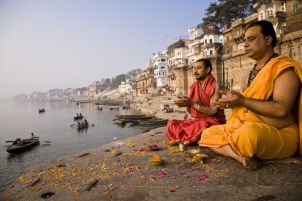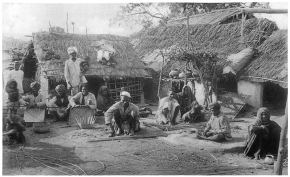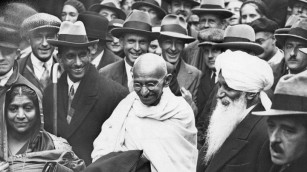The word “caste” comes from the Portuguese word casta, meaning “race, lineage, tribe or breed.” It originally comes from the Latin word castus meaning pure. The Spanish and Portuguese used the word differently in the Renaissance period; to the Spanish, it was applied more in a hereditary way, indicating family and/or lineage. For the Portuguese, it leaned toward something more akin to “breed” or social standing.
Many know that India was a British Colony but what many do not know is that it was a Portuguese one as well. From the beginning of the 16th century, the “Estado de India” or State of India was a Portuguese colony until 1961, when the country of India invaded Portuguese India and a treaty was signed. In fact, the Portuguese had a far longer history as a colonial power in India than did the British. For an American, this is nearly unheard of unless you are a history buff. While this is as oversimplification of the complicated workings of colonialism in India, we will delve into this to make a point, I promise.
This same time period of Portuguese rule (Early 1500s to 20th Century) is marked by British rule in India, which ended in 1947. While the Portuguese were the first, after the Romans, to begin trading with modern India, it was the British who seized dominance by the mid-19th Century. In 1661, Portugal was at war with Spain and needed assistance from England. This led to the marriage of Princess Catherine of Portugal to Charles II of England, who imposed a dowry that included the insular and less inhabited areas of southern Bombay while the Portuguese managed to retain all the mainland territory north of Bandra up to Thana and Bassein.
While the British were in India before this, this marriage marked the beginning of rulership, not just trade, within India. What is interesting to note is what while the Portuguese were using the word casta to denote the hereditary social groups they perceived in India almost as soon as they arrived, it wasn’t until 1613, during the time of British interest, that we see the word translated to “caste.”
 What may surprise some people is that there is no Hindu word for “caste.” In Hinduism, rising from ideas within the Rig Veda, the term associated with the Vedic social structure is varna.
What may surprise some people is that there is no Hindu word for “caste.” In Hinduism, rising from ideas within the Rig Veda, the term associated with the Vedic social structure is varna.
According to one author, “The Four Varna system reflects a deep ecological and yogic vision of social and universal unity very different from the divisive idea of caste by birth.” This is an organic and natural social order that does not coincide with a hierarchy of rule which was applied by both the British and the Portuguese. The term varna is not specifically found in Hindu writings until later, possibly as an add-on in the Purusha Sukta. The text noted to discuss this social structure is:
When they divided Purusa how many portions did they make? What do they call his mouth, his arms? What do they call his thighs and feet? The Brahman was his mouth, of both his arms was the Rajanya made. His thighs became the Vaishya, from his feet the Shudra was produced.
The basic idea of this is that we, humanity, are one construct made up of different, outward talents. The one construct, the Purusa, is the cosmic being, or some say, the cosmos itself. All human structure is built off this Purusa. Some may have an inclination toward knowledge and thought (Brahman), like a philosopher or religious person, and some way have an inclination toward service (Shudra) like a fireman or waiter.
However, all are part of the same construct called humanity and all have a part to play in helping the body move. No one of these is higher than the other – they are all necessary. Additionally, there was never the idea, in Vedic writings, of a non-Varna, or outcast/out caste member. Everyone is part of the whole. It would not make any sense to have a whole and then have something that is not part of the whole. To quote another author, “There is in this original Vedic model no outcaste, Dalit or untouchable. Each Varna constitutes a necessary part of the whole and all are mutually interdependent. Each is a manifestation of the same Divine consciousness working in humanity.”
 Indeed, this is an application of the British and Portuguese who were exerting control over the Indian population.
Indeed, this is an application of the British and Portuguese who were exerting control over the Indian population.
Either through misunderstanding or, perhaps, intentional co-opting, the Varna outline was translated and Westernized into a caste-oriented system where everyone fell into a suppressive class system, one type of human being better than the other. The adoption of these changes, from varna to caste, caused the dalit to be “created,” those that were considered outcasts and not part of society.
Dalit was a term coined about 1873, by the leader of a non-brahman-centric movement called Satyashodhak Samaj. Over time, this rigid caste hierarchy became the consciousness of a country. I remember being younger and hearing the words, “there is no caste system in India.” Yet, every Indian person I had met had embraced the idea of perhaps one group being above all others, superior to them, and others not being of equal value. The term unclean was part of the vernacular.
It’s important to know the origins of this, I think, not because of the events of history but because of the corruption of something uplifting and universal into the tool to create an oppressive society. Said clearly, from the American Institute of Vedic Studies:
“The Vedic social order was meant to instill an intrinsic feeling of unity in each individual with the greater society, and human society with the greater universe. The Varna system was based upon a transcendent ideal of human unity in the Divine, not an effort to give power and domination to one section of society.”
What was once a purely unifying religious concept was co-opted to create disharmony and foment discord among people.
 We have all seen this, as base, human need to tear down another group, using religion, education, resources, or a combination of all three in order to build the suppressive group up – whatever ‘up’ means.
We have all seen this, as base, human need to tear down another group, using religion, education, resources, or a combination of all three in order to build the suppressive group up – whatever ‘up’ means.
Freemasons care about these things because, in the search for Truth, the goal is to build up and not tear down. It is to seek truth and Truth. In order to do this, we need to understand not only human history but the motivations behind the scenes. It doesn’t hurt to dig and explore the perhaps little known histories of the world.
One of the best podcasts recommended in this is “Revisionist History,” by Malcolm Gladwell. He does an excellent job bringing out about the little known facts of what we have taken to be “truth” and made the visible. Would that we were all as curious.
There are many things which are, I think, of interest to those who want to know Truth and build a better world, things which are knowledge gaps for us. Curiosity and an open find fill those gaps and shed light. I know that I will never again think of the caste system as something arising from Hinduism, and I think this gives me the tools to help others think differently as well.
Categories: History, Philosophy, Theology



As a matter of fact, caste system is not good for Humanity. It is causing wars and separations among Humans.
I therefore come to conclusion that Masonry education and philosophy is necessary for Humanity, I regret to have not come earlier.
LikeLike